Singapore election: competing narratives of weakened cabinet if PAP loses seats vs balanced parliament
Political parties clash on cost of living, GST and need for more voices in parliament versus a stronger mandate for the PM
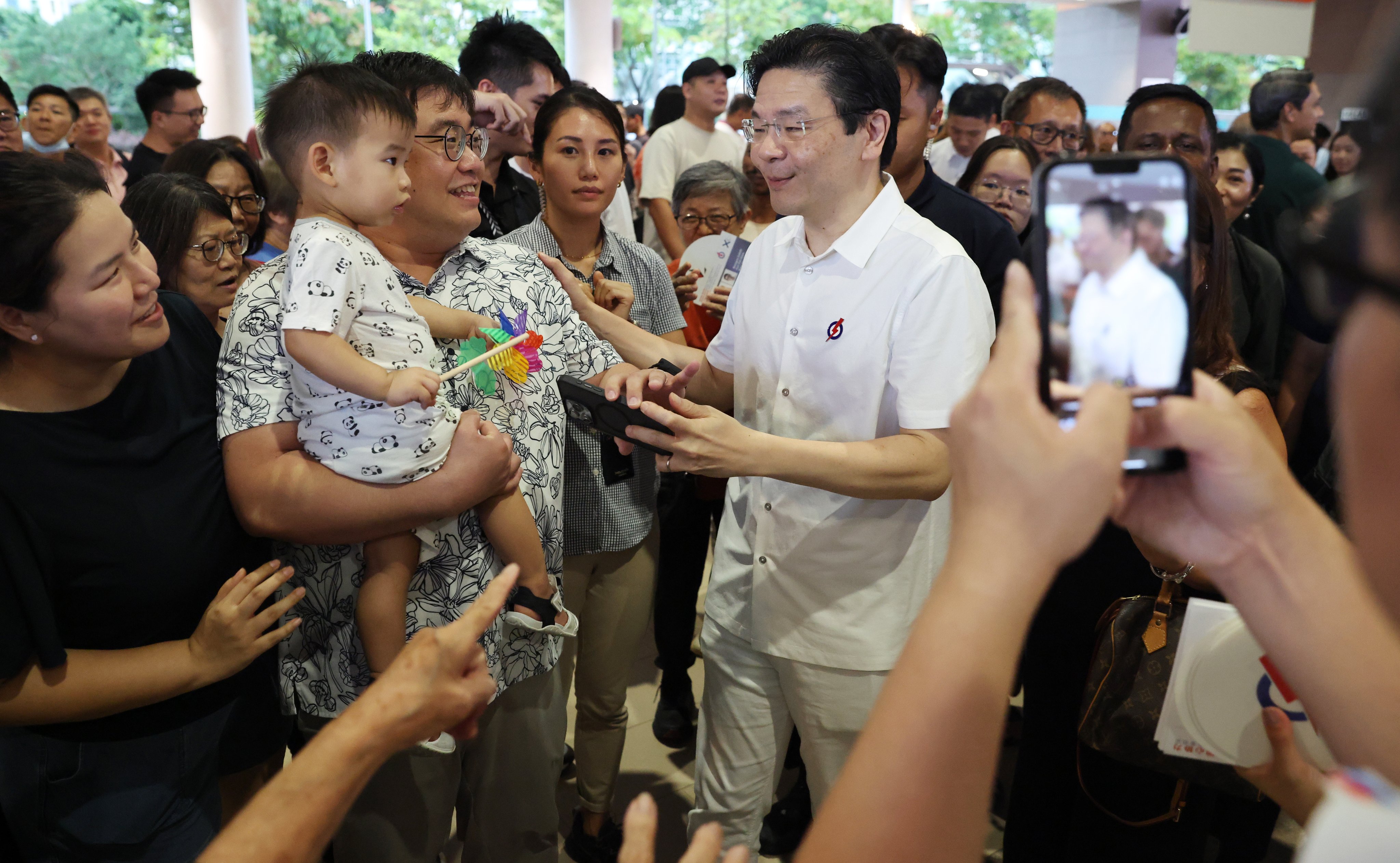
A charged election campaign ended in Singapore late on Thursday after nine days of the ruling party and the opposition trading accusations about negative politics, forging an uneasy truce to denounce race politics and arguing the need for a strong cabinet versus a plural parliament.
Then there were memes about how one was not gay, how the sun always rose whatever one felt about it and foul-mouthed rants of a hot-headed candidate, along with the serious topic of an aborted sale of home-grown insurance giant NTUC Income to German insurer Allianz.
Concerns over how the 9 per cent goods and services tax (GST) – increased last year from 8 per cent – had also added to the rising cost of living among residents, despite the flood of support vouchers.
Against this wide gamut of issues, the ruling People’s Action Party (PAP), led for the first time at the polls by Lawrence Wong as prime minister, sought to keep the focus on the dangers of a “changing world” amid an escalating tariff war threatening the country’s open economy.
But the opposition kept hammering home the message of the need for a balanced parliament with its members able to check the government and help it do better.
Friday is Cooling-Off Day, a time when all campaigning is prohibited. On May 3, around 2.75 million voters will go to the polls, including a notable group of first-time voters – over 224,000 Singaporeans aged 20 to 24.
“It boils down to where the political system should be headed,” said Eugene Tan, law don from the Singapore Management University (SMU), who added that “one-party dominance is under the microscope”, with the opposition using bread-and-butter concerns to highlight the limits of the ruling party’s dominance.
While the PAP is expected to be returned to power with a comfortable majority of seats, all eyes are on its vote share and the number of seats it may lose to the opposition.
The party has ruled for an uninterrupted 59 years in what is effectively a one-party dominant system and is hoping to block the opposition from making further headway, whether in the number of seats or the vote share to be clawed from its grasp.
In the last general election in 2020, its main opponent, the Workers’ Party (WP), won a record 10 of the 93 seats. Some 97 seats are up for grabs in this poll but the PAP has already won five seats in a walkover on Nomination Day, leaving 92 at play.
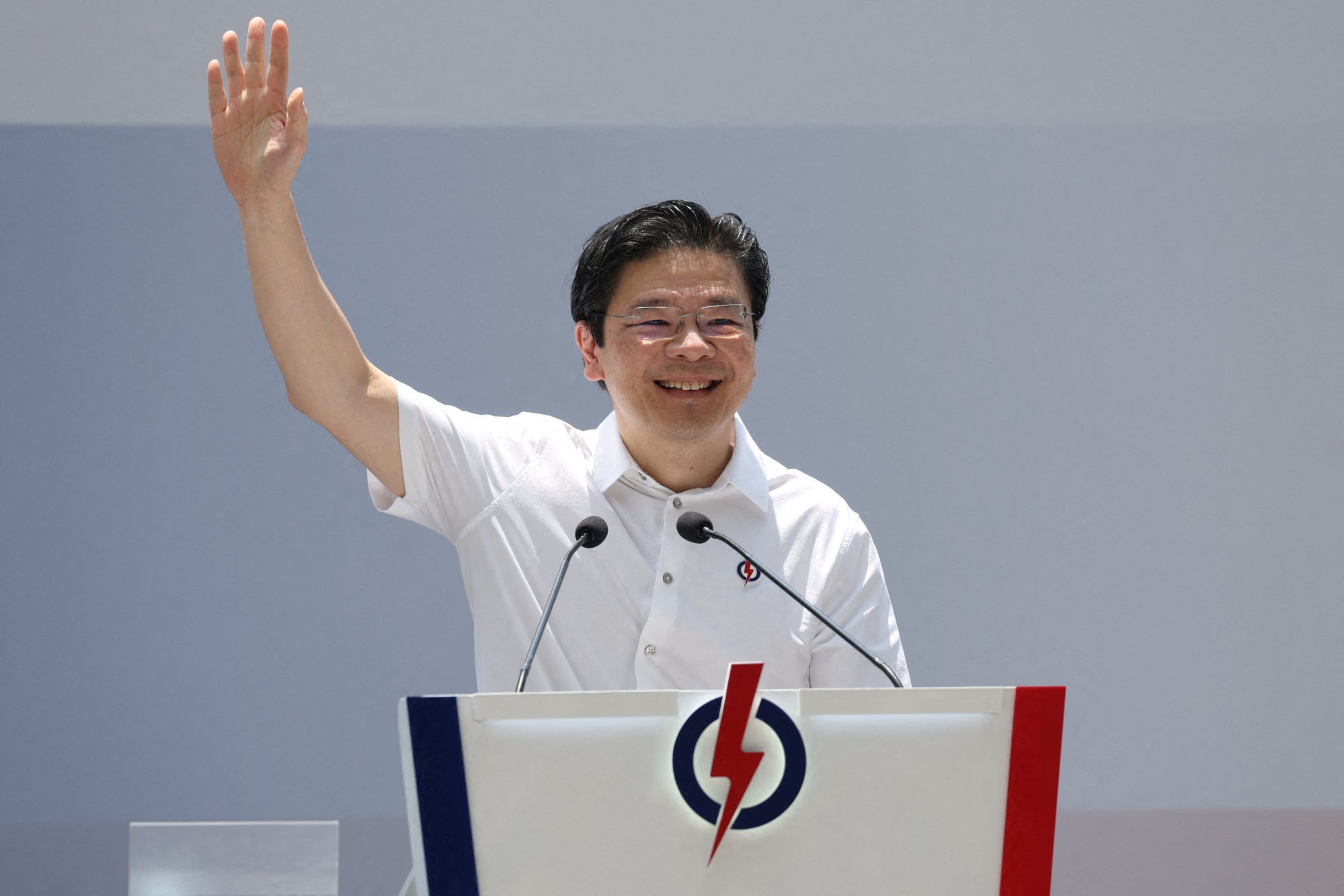
Wong has stressed the need for a strong team of ministers to steer the city state through what he called a tumultuous time in his maiden May Day Rally address on Thursday.
“Singapore has not come under the spotlight but you can be sure we will be put under greater scrutiny as well. We must expect more pressure on us and to navigate these pressures, it will take experience and skills. It will take people in government who have built up trust and close relationships with their counterparts in both America and China,” he said.
“These relationships take time to build. You can’t build this overnight. Trust, relationships take time to cultivate.”
He criticised the opposition for taking the potential defeat of ministers “so lightly”, chastising Leader of the Opposition and WP chief Pritam Singh, who had earlier on the campaign trail said Singapore’s former foreign minister and Aljunied MP George Yeo lost his ward in 2011 but the foreign ministry did not “lose its bearings”.
Wong used a football team as an analogy. “The coach can say I have backups, I have reserves, sure, but everyone knows that the team cannot function at the same level,” he warned in his address.
He also gave a special mention to Deputy Prime Minister Gan Kim Yong, who was appointed chair of the Economic Resilience Taskforce a day after the election date was announced last month.
Gan’s team faces WP’s Harpreet Singh, widely seen as the party’s star candidate for Punggol Group Representative Constituency (GRC), after the former made an eleventh-hour switch from Chua Chu Kang GRC. Gan had been the MP for Chua Chu Kang for 14 years, and also minister for trade and industry.
Call for diversity
Against Wong’s call for voters to hand him a strong mandate, the WP’s campaign message centres on the need for greater diversity in parliament to ensure the PAP cannot “do whatever it wants”. A stronger government meant proper checks and balances in place to make the administration perform better, the party said.
Singh on Thursday dismissed Wong’s football analogy of the need for a strong starting 11, saying substitutes were a critical part of any team, and sometimes changes in formations were necessary.
“Overall, I think the PAP has tremendous depth. There are only 26 WP candidates contesting in these elections, and the PAP, as we know in our heart of hearts, will win the elections,” Singh told the media in Punggol.
He had earlier stressed the need for a more balanced political system and “not where the PAP controls 90 per cent of the seats with only 60 per cent of the vote”.
At a final rally on Thursday night in Hougang, Singh implored voters: “Before you cast your vote … Remember this phrase: The Workers’ Party are a force for good.”
His party’s medium-term goal is to deny the PAP a two-thirds majority in the parliament, which would enable it to pass constitutional amendments. However, the WP failed to field more than a third of the seats owing to resource constraints, Singh said.
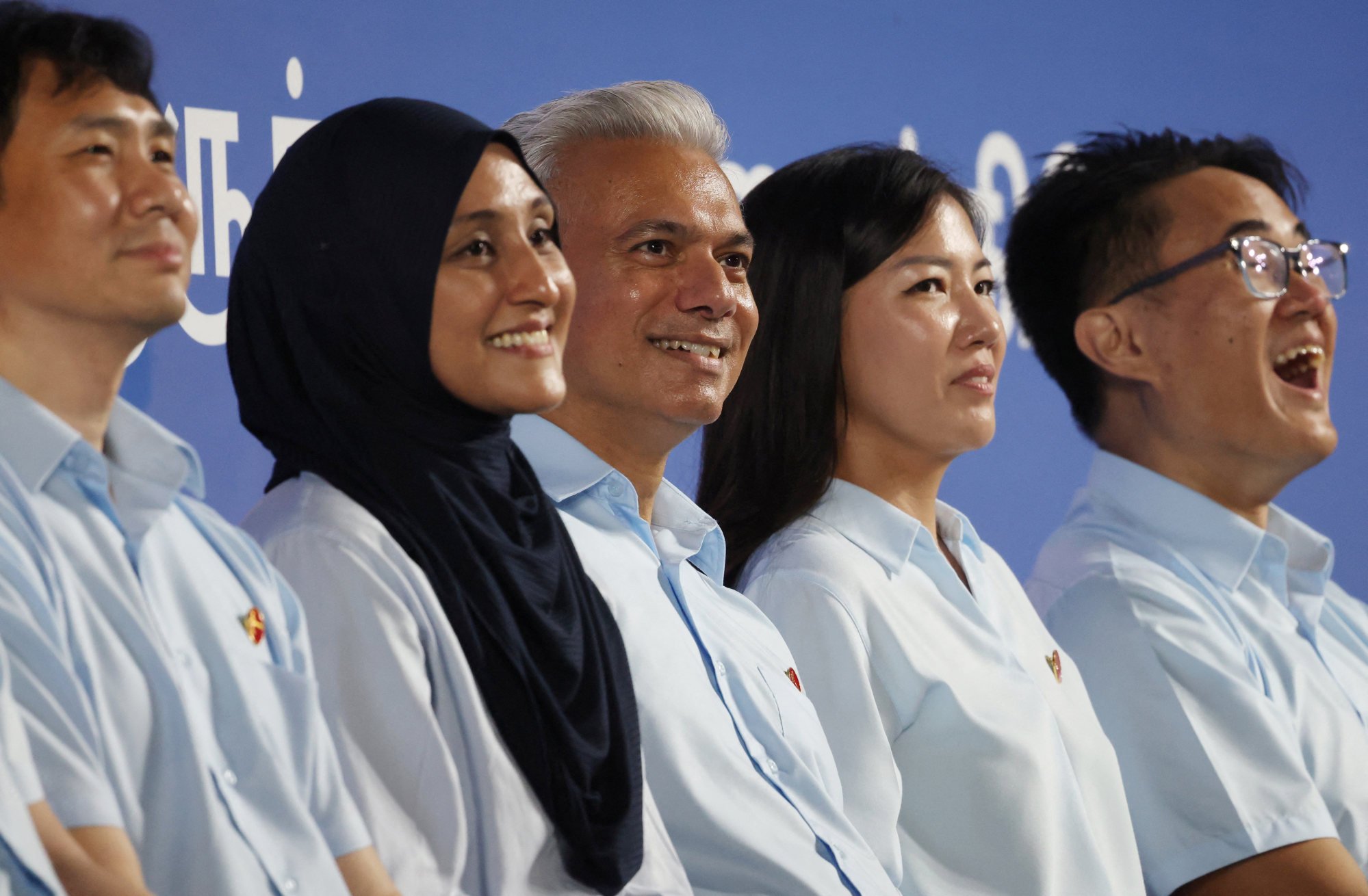
SMU’s Tan noted that the rhetoric from both sides had not changed drastically since the 2006 election when Wong’s predecessor Lee Hsien Loong led the PAP to the polls for the first time, winning 66.6 per cent of the popular vote.
“The criticisms are often the same – insensitive to people’s concerns, higher taxes in the offing, obsession with GDP, immigration,” Tan said.
“What is different this time is that the opposition seems to have ably linked bread-and-butter issues to one-party dominance. In so doing, they have shifted the voters’ focus that micro and macro are intimately linked.”
Quiet on the western front?
Aside from WP, the PAP has to contend with another opposition party led by defector Tan Cheng Bock. Tan, 85, founded the Progress Singapore Party (PSP), a small but ascendant party, ahead of the last 2020 General Election.
In that race, he led PSP to 48.32 per cent of the vote in the West Coast GRC, marking the PAP’s slimmest winning margin in the election. The result saw Tan’s party bag two non-constituency MP seats in parliament, given to the best-performing losers. The seats were filled by PSP secretary general Leong Mun Wai and first vice-chairperson Hazel Poa.
However the West Coast GRC was redrawn significantly for this election. Changes include Taman Jurong, a PAP stronghold under President Tharman Shanmugaratnam, being placed under the new West Coast-Jurong West GRC.
Tan Cheng Bock faces the team led by National Development Minister Desmond Lee. Former transport minister S Iswaran led the PAP slate in the constituency in 2020 but resigned from the party last October after being convicted and jailed for corruption-related charges.
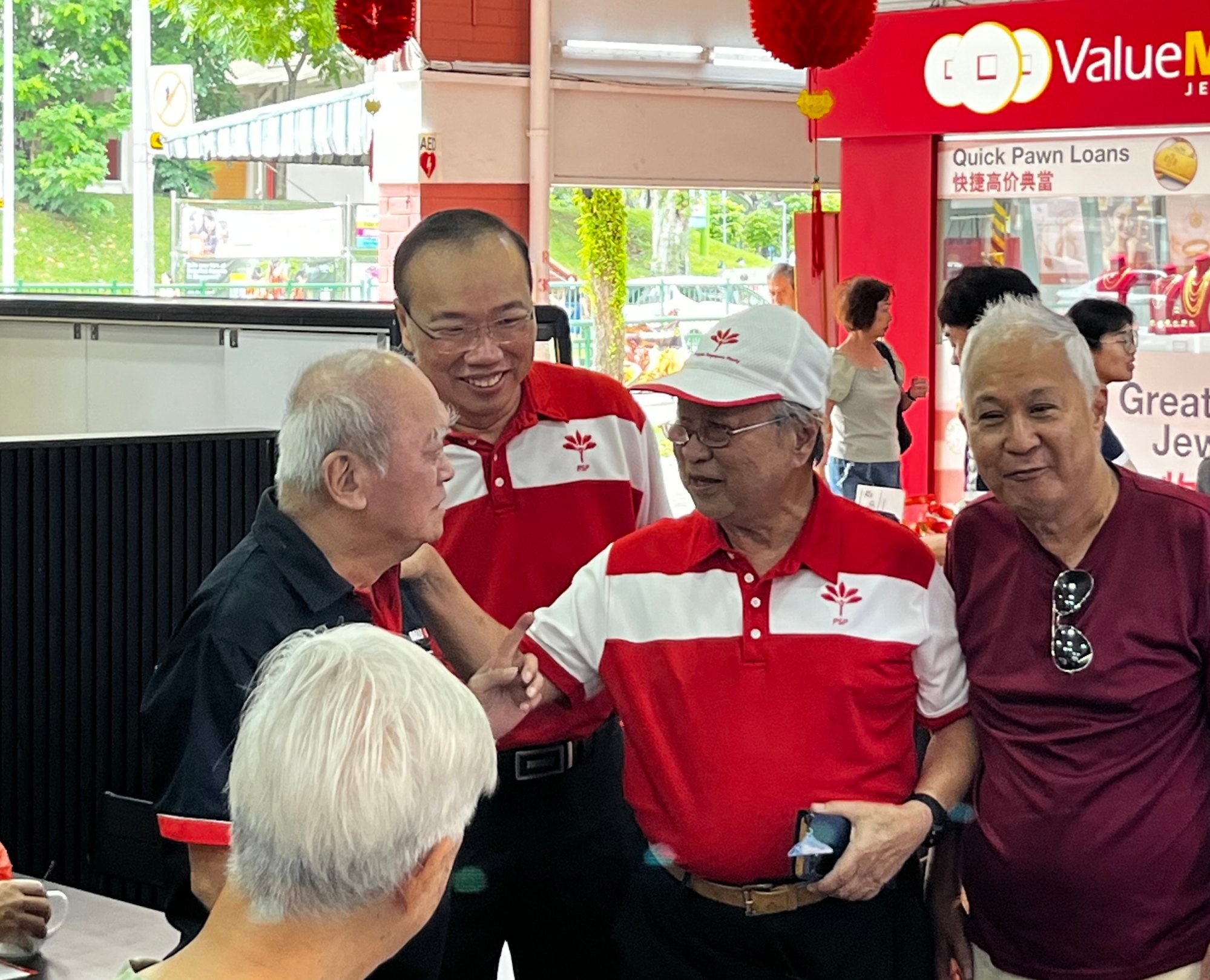
In a rebuttal to Education Minister Ong Ye Kung’s comments that Singapore did not need a strong opposition, Tan on Thursday dismissed the PAP’s “monopoly of power”, insisting: “I’m sure, when there is more opposition in the house, we are going to receive a lot of diverse, very diverse views and ideas. People must not be afraid to actually debate.”
He called his rival’s rhetoric an old one and urged for a new norm in which the government had to face the opposition and answer questions since the latter would represent the views of Singaporeans who voted for them.
“The government should just give us the answers and don’t brush it off and say that with too many [opposition MPs] we will be weakened.”
Asked what he thought of Prime Minister Wong and his predecessor Senior Minister Lee Hsien Loong focusing their efforts on WP and the hotly contested northeastern areas of Punggol and Tampines in this race, Tan said this was testimony to the fair fight his party desired.
“It’s important that people see PSP as a very responsible party coming into parliament,” he said, praising Leong and Poa’s performances. “[The PAP] realises that our party is a party that has got a lot of meat. It’s got a lot of substance.”
Key moments
The nine days leading up to the polls have seen controversy and sharp exchanges across the political divide.
The government’s decision to go ahead with plans to raise the GST over two years was also heavily criticised by the opposition throughout the campaign. It was first raised to 8 per cent at the start of 2023 and 9 per cent in 2024.
WP’s Singh said the tax hikes had “turbocharged” inflation, which worsened cost pressures felt by Singaporeans.
He agreed with the government that the hikes were needed to shore up enough for healthcare expenditure and cover other costs, but argued the move could have been postponed.
Wong, hitting back, said the issue had been weaponised by the opposition as “they know it’s to their advantage to make this an issue, to stir up unhappiness, just to maximise their votes”.
SMU’s Tan notes the discourse taps into a wellspring of concerns over cost-of-living issues.
“I don’t think the GST hikes will be a big part in how voters decide but it is a data point they will consider. The PAP would rather not have to deal with the issue but too often the rationale for the hikes may not stick as well as the criticisms of the tax amid the significant Budget surpluses over the past two years,” he said.
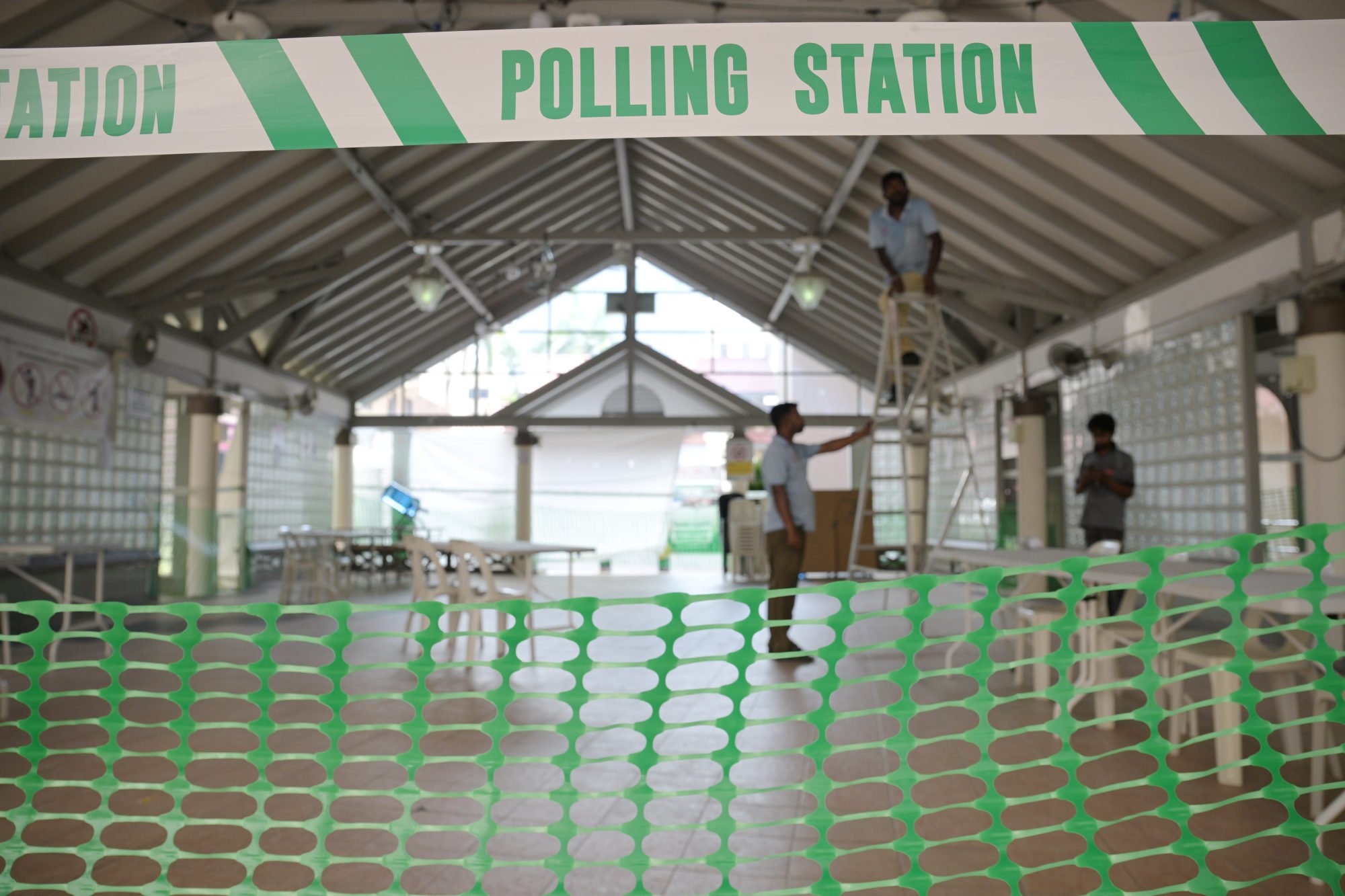
At the midpoint of the race, Wong held a press conference where he called on political parties to refrain from politicising race and religion, warning that it could fracture Singaporeans’ shared space.
“Singaporeans may have different views about issues, but we cannot allow external actors to exploit whatever differences we may have, to weaken us, or to advance their own interests,” he said.
His remarks came shortly after the Ministry of Home Affairs and elections department announced that authorities had identified several foreigners attempting to influence the outcome, leading to the blocking of several of their social media posts in Singapore.
Two of the three users were members of the Parti Islam Se-Malaysia (PAS), and the blocked posts had criticised Malay-Muslim MPs and urged Singaporeans to vote along religious lines, authorities said.
The other Facebook user involved shared the posts of a Singaporean religious teacher based in Malaysia, Noor Deroz, who had accused Malay-Muslim MPs of failing to represent the interests of the Muslim community, which did not need “another Malay MP who does not represent their views”.
Noor announced on Facebook that he had met the WP Malay-Muslim candidates, which the party confirmed. The WP noted that Noor arrived unannounced, but stressed that no promises or commitments were made to him or anyone else in exchange for political support for its candidates.
The issue of racial and religious politics is especially significant in light of two Malay-Muslim candidates from PAP and the WP leading their teams in hotspot Tampines, where nearly 25 per cent of voters are Malay. This is above the national average of about 15 per cent.
Political observer Tan said the WP’s meeting with Noor, among other Muslim religious leaders, could be the most consequential of this election cycle.
“In seeking to win support from the Malay Muslim community, the WP has undermined – despite its denials – its commitment to keeping politics and religion separate. I fear that this bad precedent will result in future attempts to win votes along sectarian lines which will be divisive and destructive to Singapore,” he said.
Meanwhile, both the PAP and WP candidates contesting in what observers have dubbed as a neck-and-neck fight in Jalan Kayu found themselves catching flak.
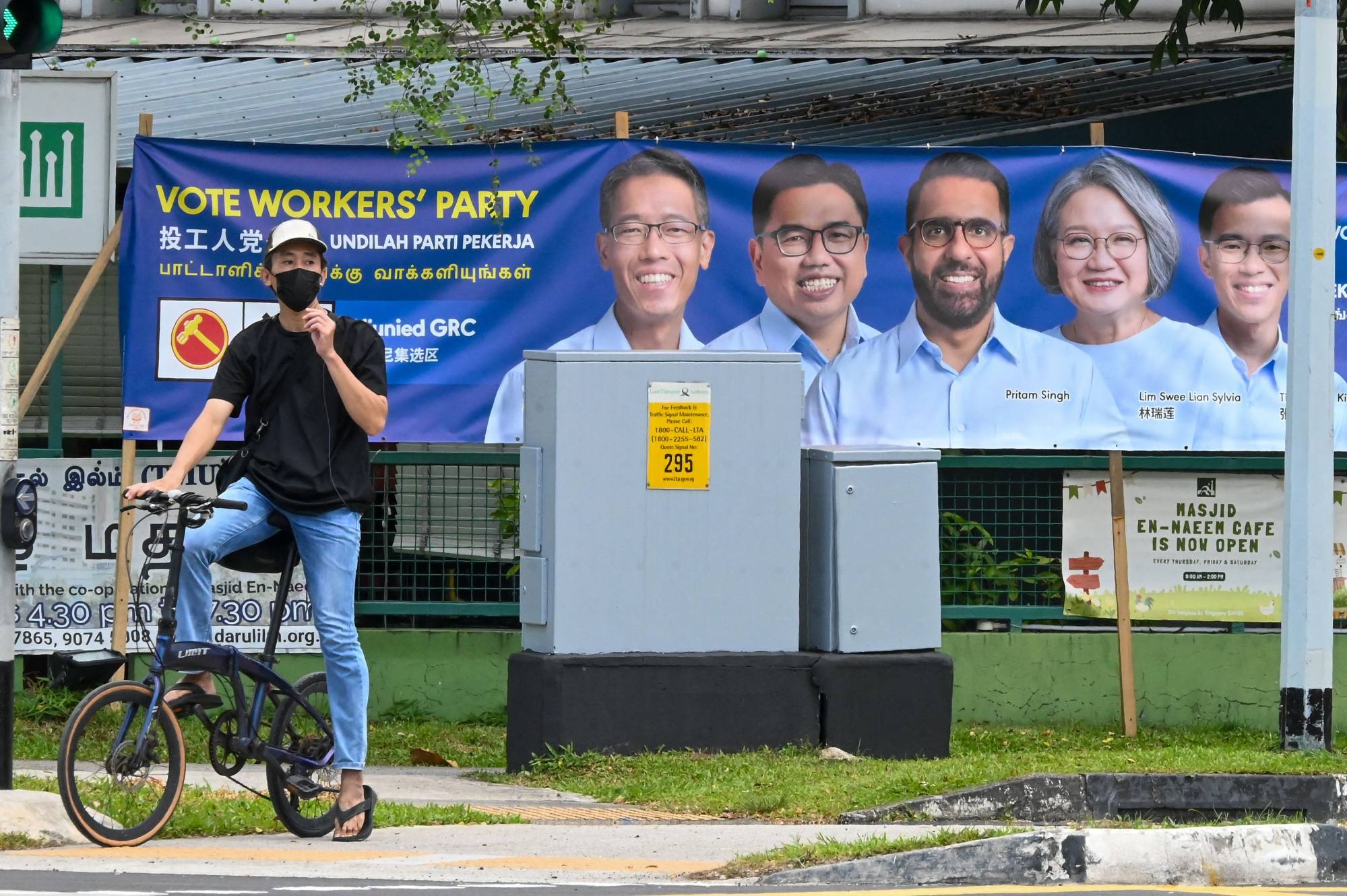
WP’s Andre Low was mired in controversy when old Telegram messages leaked overnight on social media, showing him swearing about various issues and individuals, including a resident who had repeatedly called him during his volunteer work with the party.
His opponent, Ng Chee Meng, also chief of Singapore’s labour group the National Trades Union Congress, faced scathing criticism for his involvement with the blocked sale of home-grown Income Insurance to German insurance giant Allianz.
Last October, the government intervened to stop the proposed acquisition of a majority stake in Income, worth S$2.2 billion (US$1.68 billion), after several members of the public raised concern about whether Income would still be able to fulfil its social mission of providing affordable insurance to Singapore.
Political observers who previously spoke to This Week in Asia said the blocked deal had re-emerged as Ng’s biggest challenge in the Single Member Constituency.
The election outcome ultimately rests on what parliamentary system voters want, according to observers.
“The accent is perhaps on a more balanced political system with declining one-party dominance. This general election will inform us how well the PAP will be able to manage the political change in the coming decade,” Eugene Tan said.